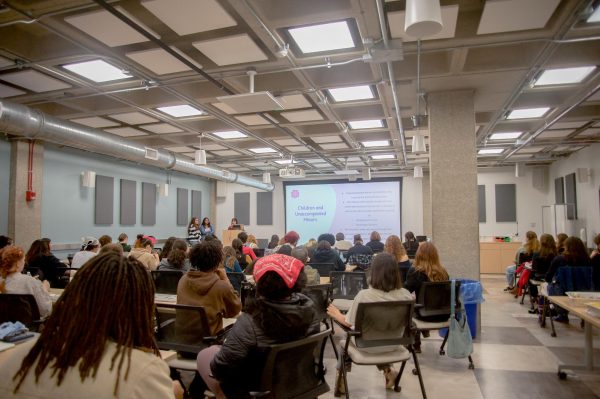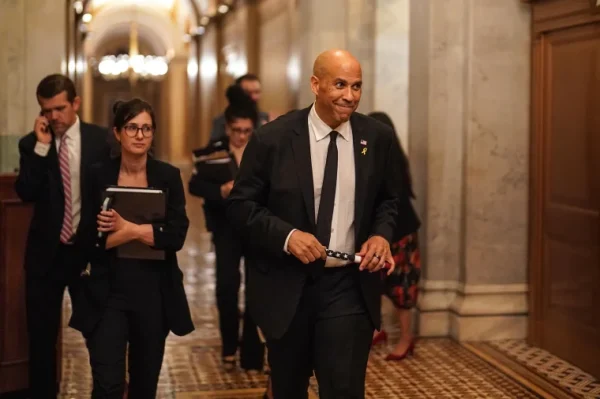Breonna Taylor Event Creates Space for Collective Dialogue, Support
As Student Senate’s Race Relations and Equity Liaison, one of my missions is to put the voices of oppressed people at the forefront when addressing issues that impact their communities the most. I want to give people that are experiencing injustice the platform to be leaders, and the option to speak for themselves and let this institution know what they need and why they need it. I did this last Thursday on Oct. 15, 2020 when I hosted the Breonna Taylor Event for Black women and femmes with co-facilitators Jane and Eric Nord Associate Professor of Africana Studies Pam Brooks, Director of Africana Studies and Faculty in Residence of Afrikan Heritage House Candice Raynor, Dr. Maya Akinfosile, and alumna and executive director of the local YWCA Mrs. Jeanine Donaldson ’75 — all Black women who do amazing work and activism for the Black community both on- and off-campus.
I created this event because I was heartbroken by Breonna Taylor’s murder and the verdict that officer Brett Hankison received. On March 13, 2020, Breonna Taylor was murdered in her home after officers Hankison, Cosgrove, Sgt. Mattingly batter-rammed her door without identifying themselves. All three men fired multiple rounds into Breonna Taylor’s home, yet only officer Hankison was charged — and with only three felony counts of wanton endangerment, at that. Wanton endangerment is when “under circumstances manifesting extreme indifference to the value of human life, one wantonly engages in conduct which creates a substantial danger of death or serious physical injury to another person.” The three counts of wanton endangerment were not for endangering Breonna Taylor’s life, but rather the lives of her three next door neighbors. That Hankison was not charged with murdering Breonna Taylor conveyed that the law does not value Black women’s lives. He was charged for firing blindly into her home and her neighbor’s home. There were so many shots fired that night that forensic scientists do not know who fired the fatal shot. In my opinion, all three men are responsible for Breonna Taylor’s murder and should be charged accordingly.
A pervasive, false narrative of criminality surrounding the Black community is used to justify murdering Black people. By claiming that Breonna Taylor held drugs for her ex-boyfriend, which justified the warrant, the Louisville Metro Police Department and media perpetuated this false narrative. There were no drugs found in Breonna Taylor’s home, and she had a new boyfriend, so the the warrant was based on invalid evidence. Moreover, a badge does not give a police officer the right to be judge, jury, and executioner.
Breonna Taylor was an EMT and pursuing a career to be a nurse. She wanted to save lives; she was not a criminal. On the other hand, officer Hankison had multiple sexual assault claims and reports of misconduct that had been erased from his record. He was a criminal, but the assumption of integrity — the exclusive domain of the police in such cases — blinded the public from seeing him, and officers like him, for who and what they really are: predators. Additionally, Breonna Taylor’s murder exposed that the LMPD designated to her neighborhood a place-based investigative unit, thereby subjecting low-income people of color to over-policing based on race and class — one of many examples of how the Black community is preyed on by state forces.
Consequently, I wanted last Thursday’s event to uplift Breonna Taylor’s memory and to acknowledge that she mattered. Breonna Taylor’s name deserves to be said as much as George Floyd and any other victim of police brutality and racial violence. We created the space to offer Black women and femmes support, guidance, and knowledge about police brutality and the 400-year history of racial violence in America that Black women and femmes have endured and to which Breonna Taylor fell victim. I wanted to foster an environment where the audience and speakers felt empowered and heard. When one person was vulnerable or crying, the audience would offer support because we are stronger together.
One collective realization derived from Breonna Taylor’s murder is that anyone in the audience could have been her. My sister, my mother, my aunts, or my cousins could have been Breonna Taylor. The purpose of this event was to illuminate the historical and racial complexities of intersectional oppression that Black women and femmes face. It was amazing to have different generations of Black women and femmes in different fields present at the event because it helped conceptualize this intersectional oppression and emphasize that Black women and femmes are not a monolith. Everyone had a different opinion and offered different advice on the subject, and everyone internalized Breonna Taylor’s murder in a different way, which meant that different audience members were able to process and disseminate the conversation in a way that helped them as individuals and as members of the collective.
In the end, more work needs to be done. We received some actionable steps from all the facilitators, so I have a sense of how to move forward. This will not be the last event on police brutality and racial violence, especially because there is no guarantee that there will never be another victim of injustice like Breonna Taylor.



